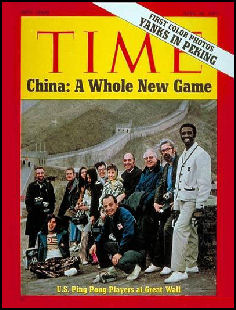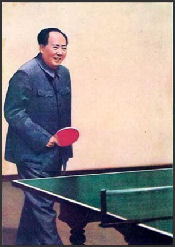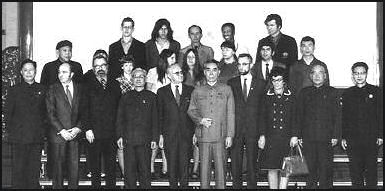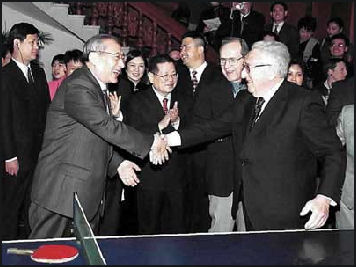PING PONG AND THE PRELUDE TO NIXON’S VISIT
 Nixon's visit was preceded by a tour of China by the American ping pong team in 1971. The American team had received a surprise invitation from China while they were playing in Japan. They were the first Americans to be invited to China since the Communist victory in China in 1949. Four days after receiving the invitation the 15-member team crossed into mainland China from Hong Kong. The team members were photographed in front of the Great Wall, made it on the cover of Time, but were thoroughly demolished in every game they played.
Nixon's visit was preceded by a tour of China by the American ping pong team in 1971. The American team had received a surprise invitation from China while they were playing in Japan. They were the first Americans to be invited to China since the Communist victory in China in 1949. Four days after receiving the invitation the 15-member team crossed into mainland China from Hong Kong. The team members were photographed in front of the Great Wall, made it on the cover of Time, but were thoroughly demolished in every game they played.
Why did China invite the U.S. ping pong team and move towards establishing friendly relations with the United States. Historians believe that China was anxious about hostilities between Pakistan and India and between itself and the Soviet Union and felt that an alliance with the United States might makes its neighbors think twice before taking hostile action against China. The idea to invitate the team was said to be Zhou Enlai's.
The ping pong team visited China at time when signs outside train stations read: “People of the world unite and defeat the U.S. aggressors and all their running dogs!” Even so the team was treated like royalty, with VIP trips to famous sites and lavish banquets. The player who drew the most attention was 19-year-old Glenn Cowan, a long-haired, self-proclaimed hippie from California who wore a T-shirt with a peace sign on it. The visit was followed by a tour by the Chinese ping pong team of the United States and an end of the trade embargo on Chinese goods in the United States.
The whole episode began when Cowan befriended Zhuang Zeding, a legendary Chinese player at the World Championship in Nagoya, Japan in 1971. Photographs of their handshake was published in the Japanese press, giving Mao the idea of inviting the U.S. team to visit China. The invitation and the visit generated a diplomatic buzz that Nixon called “the week that shook the world.” Nixon visited China 10 months later. Mao is said to have loved the term “ping-pong diplomacy” attached to the event.
Steven V. Roberts wrote in the Washington Post, “But there was nothing naive about Zhuang’s gesture. It was a direct result of a determined campaign by China’s top leaders to deploy Ping-Pong as the “perfect instrument of Communist propaganda.” Cowan, concludes Griffin, “was more like a mark in a con game than an accidental diplomat.” Still, the impact of that “con game” was very real. The American team was then invited to tour China, producing “the biggest story of the year.” Chinese premier Zhou Enlai “played another subtle card,” granting visas to foreign journalists and guaranteeing breathless coverage. [Source: Steven V. Roberts, Washington Post, January 24, 2014. Steven V. Roberts teaches journalism and politics at George Washington University |=|]
Good Websites and Sources: Nixon’s Visit to China chizeng.com/nixon ; The New Yorker newyorker.com ; Wikipedia article Wikipedia ; Mao’s Mausoleum Wikipedia ; News of Mao’s Death BBC
RELATED ARTICLES IN THIS WEBSITE: REPRESSION UNDER MAO, THE CULTURAL REVOLUTION AND NIXON factsanddetails.com; NIXON'S VISIT TO CHINA AND HIS MEETING WITH MAO factsanddetails.com; CHINA AND UNITED STATES Factsanddetails.com/China ; AMERICAN AND CHINESE POLICY Factsanddetails.com/China
RECOMMENDED BOOKS: Ping-pong Diplomacy: The Secret History Behind the Game That Changed the World” by Nicholas Griffin, Scribner, (Simon & Schuster), 2014 Amazon.com; “The Origin of Ping-Pong Diplomacy: The Forgotten Architect of Sino-U.S. Rapprochement” by M. Itoh Amazon.com; "On China” by Henry Kissinger, Amazon.com; “The Cambridge History of China, Vol. 15: The People's Republic, Part 2: Revolutions within the Chinese Revolution, 1966-1982"by Roderick MacFarquhar and John K. Fairbank Amazon.com “Nixon and Mao: The Week That Changed the World” by Margaret MacMillan, Barbara Caruso, et al. Amazon.com; “A Cold War Turning Point: Nixon and China, 1969-1972" by Chris Tudda, Aaron Killian, et al. Amazon.com; John Adams: Nixon in China (The Metropolitan Opera HD Live) (DVD+Blu-Ray) Amazon.com;
Henry Kissinger Secretly Visits China
Steven V. Roberts wrote in the Washington Post, ““So the whole world heard Zhou tell the team that they had “opened a new page in the relations of the Chinese and American people.” Two of the most ardent listeners were President Richard Nixon and his national security adviser, Henry Kissinger, who had good reasons of their own to grasp the hand Zhou was offering. The president desperately wanted to end the war in Vietnam, and Russian leaders were refusing to play peacemaker. “China was the only other player with influence in Hanoi,” Griffin writes. “Nixon would be standing for re-election in 1972. Vietnam and a declining relationship with Russia had ground down Johnson’s presidency, but an olive branch to China could turn the world on its head.” Three months later, Kissinger secretly visited Beijing. In February 1972 Nixon made his own journey and created a new metaphor for a leader who departs from his past, defies old allies and embraces an idea he once criticized. [Source: Steven V. Roberts, Washington Post, January 24, 2014]
Nixon’s visit was set up in 1971 when Henry Kissinger secretly met with Zhou Enlai. The White House reported that Kissinger was taking a day off during a trip to Pakistan and a decoy motorcade was even set up with wailing sirens to play up the bluff. The charade almost fell through when a British journalist saw Kissinger at the airport and was told he was heading for China. The reporter called his newspaper but the story was killed because it sounded too absurd to be true. [Source: New York Times]
Kissinger made two preliminary visits to China. It was Nixon’s idea to visit China. When Kissinger first heard of the plan he thought Nixon was nuts. Nixon enjoyed the clandestine nature of the plan, code-named Polo One. Kissinger liked the fact that Secretary of State William Rogers was not informed. Key allies were not informed either. Britain and Japan expressed their anger about it later. H.R. Handleman’the advertising man of Watergate fame — carefully scripted the trip for maximum P.R. value.
David Ignatius wrote in the Washington Post: “Working with his brilliant and ambitious national security adviser, Henry Kissinger, Nixon let himself think the unthinkable. “It’s interesting, looking back, to see how carefully Nixon prepared the way. In April 1971, he approved a trip to China by the U.S. national pingpong team, announced a plan to ease travel and trade restrictions, and said that one of his long-term goals was the normalization of relations with China. The Chinese responded that spring, through Pakistan, that Nixon himself would be welcome in Beijing. Nixon initially sent Kissinger instead, on a July 1971 secret mission that was facilitated by the Pakistanis. According to Nixon biographer Stephen Ambrose, Kissinger sent a one-word coded message that his mission had succeeded: “Eureka.” [Source: David Ignatius, Washington Post, February 10, 2012]
“Nixon announced Kissinger’s mind-boggling trip on television with what, in retrospect, was a comforting lie: He said that the opening to China “will not be at the expense of our old friends” in Taiwan. “Nixon departed on his own journey to Beijing on Feb. 17, 1972. His words to Mao Zedong, quoted by Ambrose, are a testimonial to the value of changing course when it’s advantageous to do so: “You are one who sees when an opportunity comes, and then knows that you must seize the hour and seize the day,” Nixon said, paraphrasing Mao’s own words. The statement was just as true of Nixon.
Glenn Cowan and Ping Pong Diplomacy
A naturally gifted ping-pong player, Cowan grew up in New York and California and said publicly that he liked to do drugs. He brought drugs with him to Japan and spent the night there with a woman he met in a bar. Several members of the U.S. Table Tennis Association wanted him excluded from the trip to China.
In April 1971, Cowan had just finished practicing and was trying to get to the main stadium during the tournament in Nagoya. He flagged down a shuttle bus with the tournament logo, and climbed aboard and realized it was occupied by the Chinese team. With no seats available he stood by the door and faced backwards. Addressing the stares that greeted him he broke the silence by saying in English , “I know my hat and hairstyle and clothes look funny to you. But in the U.S., lots of people look like this.” The Chinese say Cowan accidentally “stumbled up the steps” of their bus. Cowan said: “I was invited actually to board the Chinese bus with the team, which shocked me of course.”

Zhuang Zedong, three-time world champion, was seated near the back of the bus, A translator told him what Cowan had said. Zhuang later said, “Even now, I can’t forget that naive smile in his face.” While sitting in the bus Zhuang decided he would give Cowan a gift, and presented him with a brocaded tapestry woven the city of Hangzhou. Cowan stepped off the bus holding the tapestry with a smiling Zhuang at his side. Photographers captured the two smiling athletes together. The picture were printed on the front pages of Japanese newspapers and the story was picked up by AP and Agence France Presse. Later Cowan gave Zhuang a T-shirt with an American flag and a peace sign. In front of the media, Cowan was asked if he’d like to visit China he said yes he would. More news.
The Chinese team traveled to Nagoya under the slogan “friendship first, competition second.” Even so they were ordered not to pose for photographs, exchange flags or initiate conversations with Americans. Years earlier Mao had said, “Regard a ping pong ball as the head of your capitalist enemy. Hit it with your socialist bat, and you have won the point for the fatherland.”
Zhang was upbraided for his show of friendship. In his defense he said, “Chairman Mao told us we should differentiate between American policymakers and common people. What was wrong with my action?”
Mao Decides to Invite the U.S. Ping Pong Team
Table tennis teams from Canada, Colombia, England and Nigeria had been invited and visited China before the American table tennis team did. Some Chinese officials thought the United States was fishing for an invitation by the way events unfolded in Nagoya. Chinese officials discussed the matter and rejected the idea of an invitation and the decision was forwarded to Mao as a formality.
Mao took the briefing papers on the decision with him to bed, After taking his usual sleeping pill be came across press releases on the encounter between Zhuang and Cowan. According to Wu Xujun, Mao’s nurse, Mao looked at the photos of Zhuang and Cowan and exclaimed, “My Lord, Zhuang!” and said the American team should be invited. The only thing was that Mao had told Xu to disregard any directive he issued while under the influence of sleeping pills but Mao insisted he wanted to extend the invitation and refused to go to sleep until the order had been given to the foreign ministry.
On the last day of the tournament in Nagoya, the leader of the Chinese delegation, who had avoided the slightest eye contact with any Americans, beckoned the leader of the American delegation to come over and asked how the U.S. delegation might react to an invitation.
Kissinger said, “There had been about a year of back and forth. China had sent us a specific proposal to come to Beijing, and we were on course to answer favorably. Then in the interim they invited the ping-pong team, and that reinforced in our minds what the Chinese had told us secretly.” In his memoir "White House Years", Kissinger said, the Chinese had a knack for making “the meticulously planned appear spontaneous.” he said the invitation of the American team was carefully planned, “Only Mao could have ordered this. And only Zhou could have orchestrated it.”
U.S. Ping Pong Team in China

U.S. ping pond team with Zhou En Lai
The 15-member U.S. Ping-Pong team was the first non-communist group of Americans to visit China since Mao came to power in 1949. They entered mainland China on the railroad bridge from Hong Kong.
In China , the Americans team ate and ate, were photographed at the Great Wall, watched a ballet staged by Mao’s wife, and discovered that many Chinese had no idea that a man had landed on the moon.
The Chinese threw many of their table tennis matches against the Americans. When he realized his victory in front of 18,000 people at Beijing’s Capital Stadium was charade, according to a team mate, Cowan muttered to his opponent, “F*** you, I’d have beat you anyway.” During the trip Cowan tried to make some business deals and lobbied to get himself on the cover of LIFE magazine.
On Cowan, one teammate told Sports Illustrated, “The Chinese had never seen a person with long hair and hippie ways, Thousands of people would surround him in the streets. They loved him but were also a little terrified of him, because China was very straightlaced then. They saw him as an extraterrestrial almost.” Another teammate said “Glenn was a rock star...He was the biggest thing [U.S.] table tennis had ever seen.”
When Cowan asked Zhou Enlai what he thought of the hippie movement, Zhou replied, “Young people ought to try different things. But they should try to find something in common with the majority — remember that. I wish you progress.” The next day the New York Times ran the headline: CHOU, 73, AND “TEAM HIPPIE” HIT IT OFF. After the trip in Hong Kong, Cowan said, “I loved China. I loved the Chinese. Where else, man, would you see a child of three carrying a child of two in his arms?”
Account by Ping Pong Member

Vice Premier Li Lanqingg and Kissinger in 2001
The members of the American ping pong team were the first Americans allowed in China since the Communist take over there in 1948. A member of the team, Connie Swerris, later wrote in Newsweek: “The team was in Japan for the last day of the Tokyo World Championships, and we were stunned by the offer...Before we left Tokyo, the U.S. Embassy took our passports and used a black marker to cross out a section that forbade travel in China. That’s when I knew this wasn’t going to be an ordinary trip.”
“We stuck out like sore thumbs. All the Chinese wore uniforms, either gray or blue pants with high-collared tunics, while we were each decked out on typically American garb: jeans, windbreakers, T-shirts. Glenn...waked around Beijing wearing tie-dyed jeans and a red Rambo-style sweatband. Schoolkids followed him through the streets, which were filled with two- and three-wheeled bicycles and human-drawn carriages...Meals were routinely eight to 10 courses, four or five times a day. At first I would ask what we were eating, but after I got answers like shark’s stomach soup, chicken-feet soup and monkey’s head, I stopped.”
On my first day I saw a sign on a store window that read something like: PEOPLE OF THE WORLD DEFEAT THE U.S. AGGRESSORS AND THEIR RUNNING DOGS! Later, when we went to an opera, the plot seemed to be a lesson about communism triumphing over capitalism....Portraits of...Mao Zedong were everywhere...And most places had red books of Mao’s quotations where you would expect to find Bibles.”
“We played our Ping-Pong matches in an 18,000-person stadium, and even though the Chinese players were the best in the world, they let us win a few games...Afterwards, when we met with Prime Minister Zhou Enlai, Glenn Gowan asked him what he thought of American hippies. “Youth wants to seek out the truth, and out of this search various forms of change are bound to come,” the premier responded, his eyes sparkling.”
I didn’t fully realize the impact of my team’s trip until a few decades later, when my son found a photo of me in his high-school history book. I was standing on the Great Wall of China. When my team returned in 2006 for the 35th anniversary of the visit, I realized we were more than just another tour group from the West. We were this group that made such tours possible.”
U.S. Ping Pong Team After Their Visit to China
Ten days after the table tennis tour, in a message delivered by the Pakistanis, Zhou told Nixon that — the Chinese government reaffirms its willingness to receive publically in [Beijing]...the President of the United States himself for a direct meeting and discussion.” Nixon and Kissinger toasted the message as “the most important communication that has come to an American President since the end of World War II.”
After the China trip, Cowan was diagnosed as a manic depressive and had drug problems. He became obsessed with Mick Jagger and Mao and freaked out when he didn’t take his medication. He worked for a while as a school teacher and sold shoes and was homeless for many years. He had heart bypass surgery when he was in his late 40s and died of a heart attack in 2004 at the age of 52. Only publications related to table tennis ran an obituary.
In “Ping-Pong Diplomacy,” Nicholas Griffin wrote “Cowan once told a news conference, “I think I could mediate between Zhou En-lai and Nixon quite easily.” What he couldn’t do was handle fame. A book and a TV pilot flamed out. Drugs and depression flared up. When he died in 2004, a friend said, “After China everything seemed to be useless.”
Image Sources: National Archives, Time, YouTube
Text Sources: New York Times, Washington Post, Los Angeles Times, Times of London, National Geographic, The New Yorker, Time, Newsweek, Reuters, AP, Lonely Planet Guides, Compton’s Encyclopedia and various books and other publications.
Last updated August 2021
